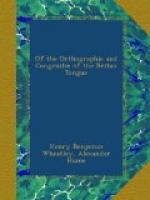8. Not is an adverb, non in latin, and in our tong followes the verb that it nulleth; as, heer not, grant not; I heer not, I grant not; I wil not heer, I wil not grant.
9. Ane, in our idiom, and an. Ane is a noun of nu_m_ber, in latin unus; an a particule of determination preceding a voual, as we have said cap. 3, sect. 4.
10. Thee and the. Thee is the accusative of thou; as, thou loves God, and God loves thee. The is the determined not of a noun, of q_uhi_lk we spak cap. 3, sect. 3.
OF THE CONJUNCTION.
Cap. 12.
1. Conjunction is a word impersonal serving to cople diverse senses. And of it ther be tuoe sortes, the one enu_n_ciative, and the other ratiocinative.
2. The conjunction enunciative copies the partes of a period, and are copulative, as and; connexive, as if; disjunctive, as or; or discretive, as howbe it.
3. The ratiocinative coples the partes of a ratiocination, and it either inferres the conclusion or the reason.
4. Therfoer inferres the conclusion; as, noe man can keep the law in thought, word, and deed: and therfoer noe man befoer the judg of the hart, word, and deed, can be justifyed be the law.
5. Because inferres the reason; as, I wil spew the out, because thou art nether hoat nor cald.
OF DISTINCTIONES.
Cap. 13.
1. A distinction is quherbe sentences are distinguished in wryting and reading. And this is perfect or imperfect.
2. A perfect distinction closes a perfect sense, and is marked with a round punct, thus . or a tailed punct, thus ?
3. The round punct concludes an assertion; as, if Abraham was justifyed be workes, he had quherof to glorie.
4. The tailed punct concludes an interrogation; as, sal we, quha are dead to syn, leve to it?
5. The imperfect distinction divydes the partes of a period, and is marked with tuoe punctes, the one under the other, thus : and is red with half the pause of a perfect punct; as, al have synned, and fallen from the glorie of god: but are justifyed frelie be his grace.
6. The com_m_a divydes the least partes of the period, and is pronunced in reading with a short sob.
7. The parenthesis divydes in the period a sentence interlaced on sum occurrences q_uhi_lk coheres be noe syntax w_i_th that q_uhi_lk preceedes and followes; as, for exemple of beath, and to conclud this treatesse:
Bless, guyd, advance, preserve, prolong
Lord (if thy pleasur be)
Our King and Queen, and keep their
seed thy name to magnifie.
* * * * *




